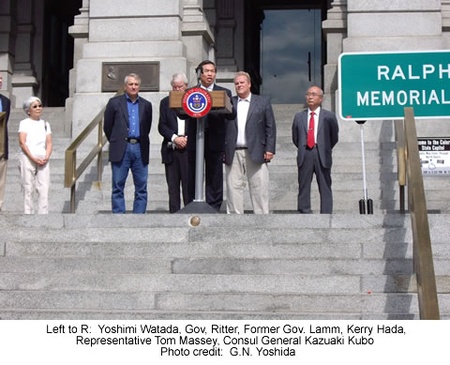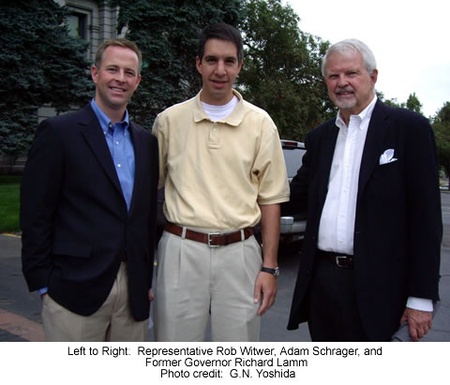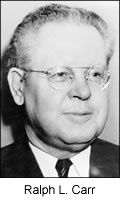On March 14, 2008, Representative Rob Witwer presented House Resolution HJR08-1010 to rename part of Colorado Highway 285 as the “Ralph Carr Memorial Highway” which passed in the Colorado House of Representatives and Colorado Senate unanimously, in honor of Governor Ralph Carr who stood up to protect the Constitutional civil rights of Japanese Americans during World War II.
Following the passage, George T. Sakato (442nd RCT and recipient of the Congressional Medal of Honor), veterans of the Military Intelligence Service, other WWII vets, Korean War, and other Army veterans were welcomed by the legislators and recognized individually for their service to their country. Also recognized were Camp Amache survivors and Mitchie Terasaki, who served several governors from Governor Carr through Governor Steve McNichols. Adam Schrager, author of The Principled Politician: The Ralph Carr Story filmed the event for his news station, and family members of the guests were present to witness this historic occasion.
Five months later, on August 10, 2008, the “Ralph Carr Memorial Highway” sign was unveiled at the Colorado State Capitol grounds and the legacy of Ralph Carr continues. Governor Bill Ritter, former Governor Richard Lamm, Representative Rob Witwer, Representative Tom Massey, Consul General Kazuaki Kubo, attorney Kerry Hada, veterans of WWII and Korean wars, Amache survivors, members of the Japanese community, an Asian American Bar Association Vietnamese lawyer plus other Asian American Bar Association attorneys, and Adam Schrager and his family attended the sign unveiling.
Rob Witwer, organizer of this unveiling, introduced Governor Bill Ritter, former Governor Richard Lamm, Representative Tom Massey, Kerry Hada and Consul General Kazuaki Kubo. All talked about Governor Carr as a principled, disciplined man who responsibly protected the Constitutional rights of Americans.
Governor Lamm’s presence was of particular interest, because he courageously opposed the Winter Olympics from coming to Colorado, as he felt strongly that the beautiful scenic route from the border to Kenosha Pass, Colorado, would be destroyed by construction of the Winter Games’ facilities. His wisdom and stance to oppose the Olympics helped preserve this beautiful parcel of land with majestic trees and mountain scenes--where the Ralph Carr Highway is named.
Likewise, Kerry Hada shared his Uncle Roy and Aunt Yoshiko Inouye’s story about their cross-country travel to Colorado from California. The U.S. had just gone to war with Japan and the three-car six-people caravan already had run-ins with military police and Arizona state troopers that were suspicious of their journey. They were not sure of what awaited them at their final destination.
As the vehicles crossed the border to Colorado, a Colorado Courtesy Patrol car that was parked on the roadway stopped them. “The patrolman came over to the truck, tipped his cap, and said, “Welcome to Colorado. Governor Ralph Carr and the State of Colorado welcome you. How can I be of service to you?”
Roy’s younger brother, Herb Inouye, related that, “After all the hassle and torment we went through in California, Arizona, and New Mexico, here was a patrolman sent by the Honorable Governor Carr to assist us. What a noble and honorable man he must be! This one act changed my whole perspective on true Americanism and restored my faith in the United States of America.”
Ralph Carr Served as Governor of Colorado from 1928 to 1943. He was the only governor to object to the relocation order, opposed the incarceration of Japanese Americans, and stood alone to welcome displaced Japanese Americans to Colorado. He warned other not to infringe on the rights of American-born citizens because of ethnicity.
Governor Carr further stated “We must protect the constitution’s principles for every man or we shall not have it to protect any man,” further stating that “if we imprisoned American citizens without evidence or trial, what is to say six months from now, we would not follow them into the same prison without evidence or trial?” His steadfast principled position was unpopular and it is believed to have cost him a promising political career that included his election for the US Senate in 1942.
In conclusion, the inscription on the bust of Ralph Carr in Sakura Square in Denver, Colorado, reads: “Those who benefited from Governor Carr’s humanity have built this monument in grateful memory of his unflinching Americanism, and as a lasting reminder that the precious Democratic ideals he espoused must forever be defended against prejudice and neglect.” Ralph Carr’s legacy lives.
© 2008 George Yoshida





